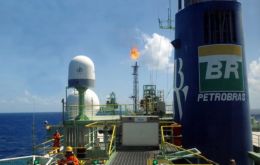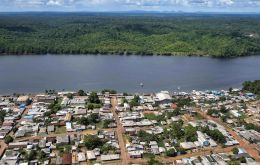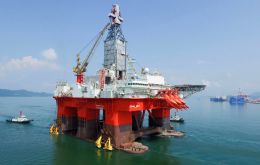MercoPress. South Atlantic News Agency
Energy & Oil
-
Saturday, November 21st 2020 - 09:21 UTC
Argentina presents incentives to attract investors for its “Gas Plan”

Companies that participate in Argentina’s natural gas production plan will have free access to the official foreign exchange market, the central bank said this week, opening a loophole in tight capital controls that have been in place for more than a year.
-
Tuesday, November 17th 2020 - 09:34 UTC
Brazil is emerging as the world's leading offshore oil producer

By Matthew Smith for Oilprice.com – Sharply weaker oil prices, the COVID-19 pandemic, and heightened geopolitical uncertainty have done little to blunt Brazil’s epic offshore oil boom. By September 2020 Brazil had soared to be the third-largest supplier of crude oil to China, the world’s second-largest economy.
-
Tuesday, November 10th 2020 - 09:39 UTC
US markets react strongly to president-elect Biden's announcement and Pfizer vaccines results

The S&P 500 ended higher but closed just shy of a record on Monday as investors bet that a full economic reopening was finally in sight following the first positive data from a late-stage Covid-19 vaccine trial.
-
Monday, November 9th 2020 - 09:21 UTC
Petrobras expects increased production from the pre-salt offshore basin

By Tsvetana Paraskova for Oilprice.com – Because of the increased production at the prolific pre-salt offshore basin, Petrobras expects its oil and gas production this year to exceed earlier guidance, Brazil’s state oil firm said when it reported its production figures for Q3.
-
Saturday, November 7th 2020 - 08:40 UTC
Four days blackout in Brazilian Amapa state: full service restoration in ten days

A fire at an electricity substation has caused four days of blackouts in most of northern Brazil’s Amapa state, disrupting the lives of hundreds of thousands of people.
-
Thursday, November 5th 2020 - 09:32 UTC
Chilean mining industry lobby cautions about the rewriting of the new constitution

Chile’s world-leading copper industry will see investment lag for at least two years as the country rewrites a constitution that underpinned nearly three decades of mining growth in the South American nation.
-
Wednesday, November 4th 2020 - 09:35 UTC
Peru with Canadian funds joins the South American lithium rush

Canada’s Plateau Energy Metals has raised nearly US$ 600 million to develop Peru’s sole lithium project and expects to start mining in 2023, a year later than planned, as the country lags its neighbors in developing the battery mineral, a company official said.
-
Monday, November 2nd 2020 - 09:02 UTC
A quarter of global floater segment faces scrapping, according to Rystad Energy

One-quarter of the global floater (offshore drilling rig) segment could be scrapped. That’s according to Rystad Energy, which outlined that restructuring in the “already stretched” offshore drilling market will accelerate.
-
Friday, October 30th 2020 - 09:37 UTC
Brazil keeps interest rate at record low, despite a spike in food and fuel inflation

Brazil’s central bank kept its key interest rate at a record-low 2.00% on Wednesday, maintaining its “forward guidance” pledge to keep rates lower for longer and even the possibility of further easing, despite the recent rise in inflation and fiscal risks.
-
Thursday, October 29th 2020 - 08:28 UTC
Petrobras cutting losses as Brazilian economy and fuel demand are increasing

Brazil's state-run oil giant Petrobras announced on Wednesday it reduced its losses in the third quarter of the year, the company's third negative result in a row due to the global economic meltdown caused by the coronavirus pandemic.
